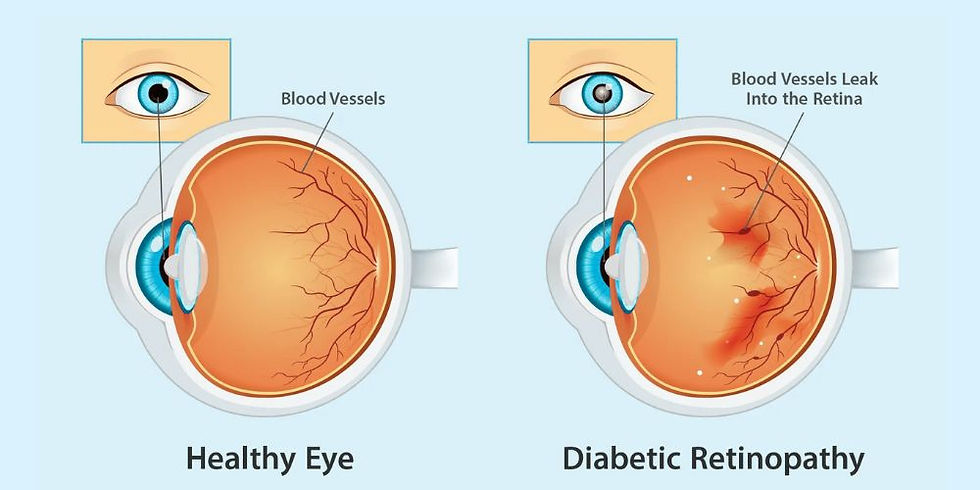Diabetic Retinopathy Emerging as Leading Cause of Vision Loss in India
- Arunodaya Deseret Eye Hospital
- Sep 30, 2025
- 3 min read

Diabetes is rapidly becoming a major public health challenge in India, and one of its most serious complications is diabetic retinopathy. This progressive eye disease affects the retina-the light-sensitive tissue at the back of the eye-and is now recognized as one of the leading causes of preventable vision loss among working-age adults. With India often called the “diabetes capital of the world,” the burden of diabetic retinopathy is expected to rise sharply unless timely measures for awareness, diagnosis, and treatment are adopted.
What is Diabetic Retinopathy?
Diabetic retinopathy occurs when high blood sugar levels damage the tiny blood vessels in the retina. Over time, these vessels may leak, swell, or close off completely, leading to vision disturbances and, in severe cases, blindness. In advanced stages, abnormal blood vessels can grow on the retina, increasing the risk of retinal detachment and permanent vision loss.
The disease often develops silently in its early stages, with patients experiencing no symptoms until significant damage has already occurred. This makes regular eye checkups crucial for individuals with diabetes.
The Rising Burden in India
According to recent studies, nearly one in three diabetics in India shows signs of diabetic retinopathy. The problem is particularly alarming in urban areas like Delhi NCR, where lifestyle changes, stress, and unhealthy diets have increased the incidence of diabetes. Unfortunately, lack of awareness and delayed diagnosis mean many patients only seek medical help when vision loss has already begun.
Experts warn that if current trends continue, diabetic retinopathy will soon become the primary cause of vision loss in India’s adult population, surpassing cataracts and glaucoma in certain regions.
Why Timely Intervention Matters
The good news is that vision loss from diabetic retinopathy is largely preventable with early detection and proper treatment. Routine screening of diabetic patients, even in the absence of symptoms, plays a critical role in safeguarding eyesight. If detected early, treatment options such as laser therapy, intravitreal injections, or vitrectomy surgery can help control the disease and preserve vision.
Ignoring early warning signs not only affects the quality of life but also places a heavy burden on families and the healthcare system.
Symptoms That Should Not Be Ignored
While diabetic retinopathy can remain silent for years, patients should consult a diabetic retinopathy doctor in Gurgaonor nearby areas if they experience:
Blurred or fluctuating vision
Dark spots or floaters
Difficulty seeing at night
Sudden vision loss in one eye
Colors appearing washed out or faded
These symptoms often indicate damage to the retina and should be addressed immediately.
Diabetic Retinopathy Treatment in Gurgaon

In Delhi NCR, access to specialized care has improved significantly, with leading institutions offering advanced retinal services. Arunodaya Deseret Eye Hospital, located in Gurgaon, is one of the recognized centers providing comprehensive diagnosis and management for diabetic retinopathy.
Under the expertise of Dr. Vaibhav Sethi, an experienced Vitreo Retina Surgeon, the hospital emphasizes evidence-based care tailored to the patient’s stage of disease. From state-of-the-art imaging for early detection to advanced surgical interventions for complex cases, the hospital ensures that patients receive world-class treatment close to home.
For those searching for diabetic retinopathy treatment in Gurgaon, Arunodaya Deseret Eye Hospital combines modern technology with compassionate care, making it a trusted choice for patients and their families.
Prevention and Lifestyle Measures
While medical treatment is crucial, lifestyle management plays an equally important role in reducing the risk of diabetic retinopathy. Some preventive steps include:
Regular eye check-ups: Annual retinal examinations for all diabetics.
Blood sugar control: Maintaining HbA1c levels as advised by your physician.
Managing blood pressure and cholesterol: High blood pressure worsens retinal damage.
Healthy lifestyle: A balanced diet, exercise, and avoiding smoking help reduce risks.
Early treatment adherence: Following medical advice promptly to prevent disease progression.
The Way Forward
Public awareness campaigns, regular screenings, and improved access to retinal care are essential to control the growing burden of diabetic retinopathy in India. Community-based programs, corporate health check-ups, and government initiatives can play a vital role in ensuring early detection.
Hospitals like Arunodaya Deseret Eye Hospital in Gurgaon, led by specialists such as Dr. Vaibhav Sethi, are already contributing to this mission by spreading awareness and providing high-quality care.
Diabetic retinopathy is steadily emerging as the leading cause of vision loss in India. However, with timely diagnosis, effective treatment, and lifestyle management, blindness due to this condition can be prevented. If you or a loved one has diabetes, do not wait for symptoms to appear-schedule a comprehensive eye exam today.
For advanced and reliable diabetic retinopathy treatment in Gurgaon, patients can turn to Arunodaya Deseret Eye Hospital, where Dr. Vaibhav Sethi and his team are dedicated to preserving vision and improving lives.







Comments